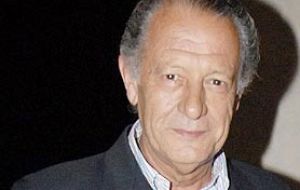MercoPress. South Atlantic News Agency
Former Argentine ambassador in Montevideo praises Uruguay’s “three Joes”
 Hernan Patiño Meyer admirer of Uruguay’s political process
Hernan Patiño Meyer admirer of Uruguay’s political process The Argentine government accepted on Wednesday the resignation of its ambassador in Uruguay, Hernan Patiño Meyer who has been involved in a political controversy following comments praising Uruguayan president-elect Jose Mujica.
According to Argentina’s Official Gazette, Patiño Mayer had tendered his resignation as Argentine ambassador to Uruguay last December 3rd. a few days before he wrote an op-ed in a Buenos Aires morning paper, praising Mujica and causing controversy in the neighbour country.
Jorge Larrañaga, leading senator for the Uruguayan opposition Partido Nacional party, had asked for the ambassador's resignation after considering he “meddled in the country's internal affairs”.
However Patilño Meyer who was summoned to the Uruguayan Ministry of Foreign Affairs and publicly apologized to Senator Larrañaga and “all those who felt hurt by his column” denied his resignation was in anyway linked to the incident.
“The main reason for my resignation is that I have held the post in Uruguay for eight years and I consider it is time for President Cristina Kirchner to nominate another representative in Uruguay”, said Patiño Meyer.
Furthermore “I’m not that stupid as to write an article to meddle in Uruguayan politics”.
In the column under the heading “The three Uruguayan ‘Joes’” the ambassador refers to and praises Jose (Joe) Artigas, the founding father of Uruguay and a strong inspirer of federalism in the region in the early 1800th; Jose (Joe) Batlle Ordoñez considered the architect of modern Uruguay and who was elected president on two occasions at the beginning of the XXth century and finally president-elect Jose (Joe) Mujica, a former guerrilla leader but still a controversial figure in Uruguayan politics.
“This old-time fighter (Mujica) has reached the presidency of a country that on voting for him has resigned to its own stereotype. His triumph is not an individual effort. It belongs to an organization (Tupamaros) that following their political and military defeat and having its best cadres suffer death, torture and jail in infamous conditions, was able, previous a process of self criticism to insert itself into a recovered democratic system and develop a policy of masses which made it the leading force in the ruling coalition, Broad Front, ensuring at the same time its second consecutive electoral victory”.
Patiño Meyer concludes saying that the arrival of the third of the Uruguayan “Joes” will not be indifferent to the region: “this small but great country has again given birth to a phenomenon that summons us to reflection and encourages hope. Reflection that should help us review our political construction methods and hope to see that coherence, honesty and commitment sometime achieve more than its antonymous”.
Although the article can be interpreted as an excessive praise for a leader who had yet to take office, Patiño Meyer’s time as ambassador in Uruguay has not been easy. In the last five years Argentina and Uruguay have clashed over several issues (besides football) but particularly on pulp mills souring bilateral relations to the extreme that the case is awaiting a ruling from the International Court of The Hague and pickets keep blocking access to international bridges leading to Uruguay.
President Tabare Vazquez position on the issue has been a strong one: no negotiations on pulp mills or relocation until the pickets are lifted and bridges opened. Meantime Argentina has blocked Mercosur infrastructure soft loans for Uruguay, has suspended dredging of shared access channels in the River Plate and Uruguay has vetoed former President Nestor Kirchner as the first standing chairman of Unasur, the Union of South American Nations, among other skirmishes.
Mujica on the other hand has said his first job will be “to fully normalize” relations with Argentina even if it means “discussing and discussing” until candles burn out. Contrary to President Vazquez he has a fluid relation with the Kirchner couple and has visited them on several occasions and has promised to begin negotiations as soon as he takes office, “Argentina is too important for us”, he argues.
As a diplomat Patiño Meyer is bound to naturally praise a “negotiator and born communicator” instead of a “stubborn” leader who stood up to the Kirchner couple bullying. Besides the former ambassador also has his guerrilla record as a former member of the Argentine Montoneros, a less sophisticated more impulsive version of the Uruguayan Tupamaros that also suffered a stunning political and military defeat. However as a branch of the hegemonic catch-all Peronist movement on the return of democracy in 1983, and even before, many reinserted themselves into the democratic process.




Top Comments
Disclaimer & comment rulesCommenting for this story is now closed.
If you have a Facebook account, become a fan and comment on our Facebook Page!